"The Aonach Eagach is arguably the most desirable ridge in Mainland Scotland to do in winter. I had a memorable experience on it in winter, however, don't try and emulate it. As teenagers, George Adam and myself decided to do the Aonach Eagach, it was one of those days when the sun was shining and it is bitterly cold with no wind. We had no climbing experience, but plenty of naivety, George had a huge Achenbrenner ice axe and I had a pair of crampons, for some reason we got along the ridge without any unfortunate incidents. The views were stunning as it was crystal clear."
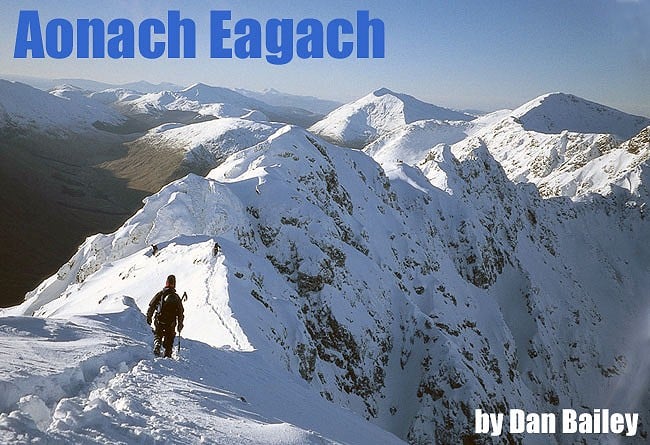
Grade: II
Distance: 10km (plus a possible further 7km on the road to retrieve your car)
Ascent: 1150m
Time: 6 hours in summer – possibly significantly longer under snow. Winter benightments are common.
Start: Layby on the A82 near Allt-na-reigh cottages (NN174567)
Finish: Minor road just short of Glencoe village (NN112585)
Map: OS Landranger (1:50,000) 41
Accommodation: Variety of bunkhouses, bothies and youth hostels. See book for details.
Sleeping out: Discreet wild camping close to the road is feasible in Glencoe.
Public transport: Scottish Citylink buses between Glasgow and Fort William run through Glencoe, and can pull over where you like.
Seasonal notes: Aonach Eagach is a much gentler beast in summer – almost disappointingly so. If climbers want to catch the ridge in memorable mood they should wait for winter. With icy rocks and delicate cornices the difficulties of the 'Notched Ridge' move up a few extra notches. Under deep snow the pinnacles are a time-consuming top-end grade II, on which twin axes, a rope and a small rack of rock protection are de rigeur. Treat it as an Alpine route and move fast to avoid an unscheduled overnight stay.
Introduction
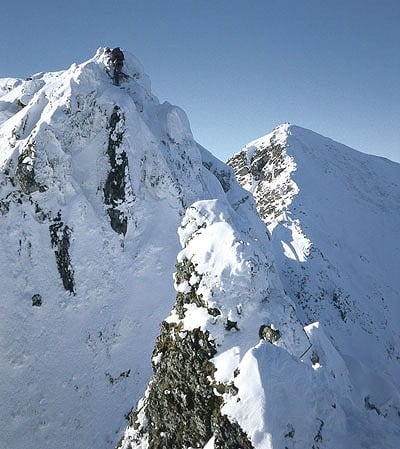
Approach
It is usually tackled from E to W. There are two customary routes onto the crest. Most climb Am Bodach direct from the Allt-na-reigh layby via a well-scuffed path, staying W of the Allt Ruigh before bearing left and steeply zigzagging with some easy scrambling onto the summit of Am Bodach. This is the recommended winter approach.
Alternatively to start the day with a bang ascend from the road at The Study, 1km E of Allt-na-reigh, and climb the craggy S face of A'Chailleach seeking out the best scrambling. This culminates in an exciting grade 3 pitch up the rightmost of three grooves in the steep yellow band at the top. Then walk 2km onto Am Bodach. This is a satisfying summer option if time and weather allow.
Climb
Winter traversers should gear up on Am Bodach, keeping the rope handy. The first difficulty is encountered soon after leaving the summit, when the narrow ridge ahead abruptly drops off at your feet. Sloping ledges on the right (N) side of the nose lead down in an exposed position to a stance at a boulder beside a small detached tower. A short chimney descends left to easier ground. In dodgy snow this whole section should be trodden cautiously, and an abseil from the boulder is a good option. An easier stretch follows, sticking to the crest as marked by occasional rusty fence posts. At a small top listed as spot height 924m on the OS 1:25,000 map, bear right down eroded ground to a small col above a deep gully; insecure snow adds spice to this brief descent. The broad top of Meall Dearg comes soon after.
The onward view promises great things, a bristling array of pinnacles beckoning all the way to Stob Coire Leith. Within the next 1km there are several substantial rock masses, subdivided into a host of smaller spikes and notches. This is the best bit of the day, often so narrow it seems that a slip could land you on the A82. In soft snow or verglas expect a protracted and insecure struggle. There's nothing harder than a grade 2 scramble or winter II, though you might feel like adding an extra numeral for atmosphere.
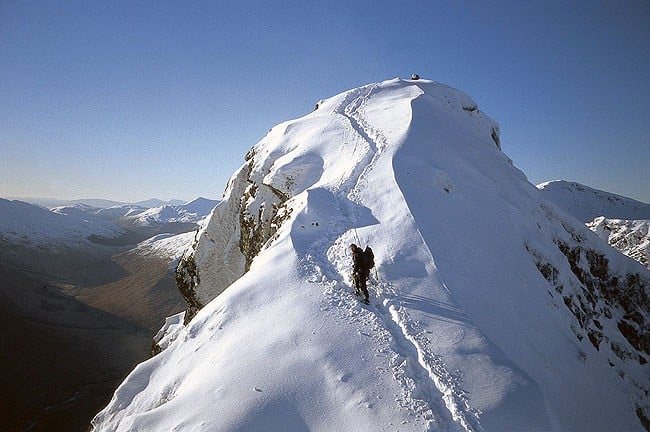
Descent
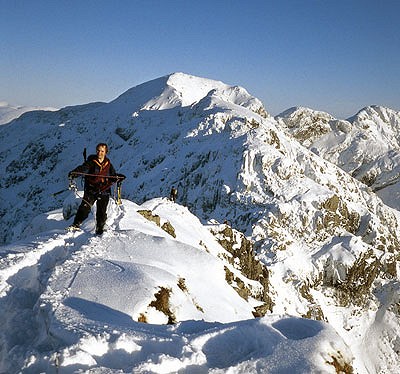
From Am Bodach westwards there is NO safe way down into Glen Coe for several kilometres (though there are points at which you can safely descend N instead). If you're caught on the pinnacles at nightfall, keep going; don't try an early descent. This can't be over-emphasised. Also note that though it's been mentioned in various guidebooks over the years the path flanking Clachaig Gully is nasty and unsafe in any season, and best avoided. If heading west along the crest the direct descent S from Sgurr nam Fiannaidh is the first relatively sensible route into Glen Coe, but rather easier if you already know it (in which case, why read this?). Given less than ideal descent conditions (darkness, say, or a blanket of fresh powder) it's not necessarily straightforward. If in doubt stay longer on the ridge, heading W from Sgorr nam Fiannaidh to the slight rise some 750m further on. Then bear NW down a broad shoulder to the col below the Pap of Glencoe. A SW descent from here picks up a path that hits the road midway between the Youth Hostel and Glencoe village. Regain your car via a hefty schlep on tarmac, or better use your thumb. Best of all abandon the car until morning and veer into the Clachaig Inn.
Scotland's Mountain Ridges
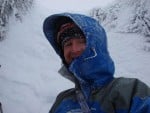
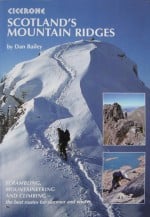
'a work of considerable authority, I can recommend (it) unreservedly.' Chris Craggs (reviewer) published on www.UKClimbing.com (May 2006)
Ridges are epic. Graceful carved walkways slung between summits, twisted spines of stone – these can be the most beautiful of mountain landforms. With elegant lines and giddy exposure, ridge climbs emit a powerful siren call, drawing us out onto the rocks.
The variety of these 48 routes reflects the breadth of the mountain experience: a rich mix of summer scrambles, technical rock and challenging winter climbs. This book covers both the popular classics and some obscure gems, aiming to celebrate these thrilling climbs as much as to document them. The chosen selection spans the grade range, with routes to suit all levels of ability. Breathtaking photography and detailed research makes this a magical source of inspiration.
The author, Dan Bailey lives in Fife and has always had a passion for climbing and the outdoors. His work has featured in Adventure Travel, The Sunday Times, Trail, High, The List, The Sunday Herald and Scotland on Sunday, among others.
Scotland's Mountain Ridges (ISBN: 978 1 85284 469 1) is priced at £17.95 and is available direct from Cicerone Press.



Comments